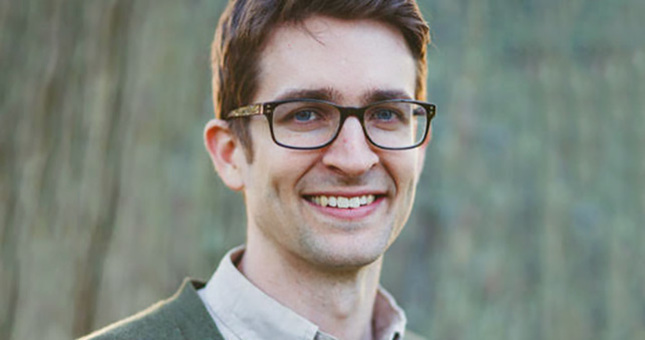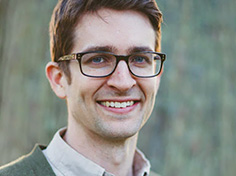
Alex Fogleman
Alex Fogleman (M.Div. 2016), in addition to directing the Institute for the Renewal of Christian Catechesis, serves as a Course Instructor for Regent’s online courses and is pursuing doctoral studies in theology at Baylor University in Waco, TX. He and his wife Molly have two Canadian-American sons, James and Thomas, and pine for Vancouver in the summertime.
An Education in Being: Catechesis and Community
The Challenge of Being Christian
When I first came to Regent in 2012, I brought a few basic but unrelenting questions: What difference does it make to be a Christian? What difference does it make to go to church? At one point, I would have considered these but two ways of asking the same question. During my time at Regent, however, these questions sharpened into clearer focus. I began to notice, in my own life and in those around me, just how much easier it was to go to church than to be a Christian. The active verb “go” was much less intrusive than the linking verb “be.” I could go and leave a church, but to be a Christian was to be shaped indelibly by the power of the gospel.
In one sense, it is easy to become a Christian. It is fundamentally an act of divine—often surprising—grace. And yet to be a Christian, to be transfigured by God’s grace and to reflect his character in one’s total habit of being—this is no simple feat. The challenge of becoming and being a Christian is one that still brings wonder and awe.
This challenge was named for me in a new way by J. I. Packer’s frequent refrains calling for the renewal of catechesis within the church today. Dr. Packer’s so-called “last crusade” to restore catechesis at first, I admit, fell on deaf ears. I did not realize the depth of Christian wisdom earthed beneath this ancient practice of instructing believers into the faith. I have since come to see that few things are timelier for the church than recovering the theologically robust, spiritually illuminating, community-forming practice of catechesis.
Catechesis names a distinctly Christian mode of pedagogy, whereby Christians are inducted into an ecclesial culture by immersion in the Apostles’ Creed, the Lord’s Prayer, the Ten Commandments, and the sacramental life of the church. They learn to become fluent in Christian doctrine, spirituality, and ethics. I have heard Dr. Packer describe catechesis as the nexus point between “the doctrine by which we live” and “how we live that doctrine.” It gets at that crucial link—so intuitive for many Regent folk—between doctrine and life, between the life of the mind and the life of faith, between knowledge of God and knowledge in God.
Catechesis and Community
Since leaving Regent in 2016, I have only been more impressed by the deeply formative role of the Regent community in the four years my wife and I lived there. We came, like so many, burdened with the incoherence of our lives. We had only inklings of what it meant to live as Christians, to be shaped by the life of the church. But at Regent we were surrounded by others whose lives had been deeply transformed by the Christian faith. Under and beyond the green roof, we encountered others—students, professors, administrators, pastors, spouses, children, friends—who marked us with some aspect of the Christian faith. This community helped us not only think about but also to imagine and to feel what it meant to be Christian.
It’s been said that you do not think your way into a new way of living but live your way into a new way of thinking. This describes our experience at Regent exactly. It also says something about how catechesis forms distinctly Christian communities. In our fractured age, individualism is decried, and community touted as the answer. But what kind of community? What kind of sociality? People often find the cure for loneliness in the solidarity of a church community. But why not join a soccer club or a reading group? Why not find solace in the form of connectivity called “social media”? What difference does it make to be a Christian community?
The obvious answer is that Jesus Christ makes all the difference. My Regent professors helped me see the church as that community formed by the Holy Spirit’s ingathering of the dispersed nations to witnesses to and participate in the death and resurrection of Jesus Christ. But what does that mean? What does it entail?
Catechesis is a way of giving content and structure to the claims that Christ makes upon the community called the church. In the early church, catechesis often lasted between one and three years, providing a time and space in which new believers could become detached from the idol-drenched communities of their pagan neighbors and cultivate the healthy attachments of worship due to the true image of God in Christ. I cannot see a more apt parallel for our own cultural moment. Catechesis is a kind of education, but not for the sake of accumulating more knowledge. It is an education for conversion in Christ. It is an education in being Christian in God’s good but broken world.
The early church adopted and adapted many of the educational institutions from Greco-Roman culture, such as their rhetorical and grammatical schools. But the early Christian catechumenate was a distinctly Christian mode of education, developed out of Christianity’s theological and social conditions. Catechesis developed above all out of the imperatives implied in the Great Commission—go, baptize, teach to obey. The practices implied in these verbs entail missional engagement (going), sacramental life (baptizing in the name of the Trinity), and a moral educational (teaching to obey). The particular genius of catechesis is the way it comprises these components into a cohesive and distinctly Christian form of education.
Catechesis in the Church Today
The (re-)turn to catechesis is gaining traction among churches today. In the past several years, several new formats of catechisms have emerged, especially within Reformed and Anglican wings of evangelicalism. Tim Keller and Redeemer Church in New York, and the Anglican Church in North America (under the theological editorship of Dr. Packer himself), have both published updated catechisms and outline the riches of orthodoxy in ways that address contemporary challenges. Christians are becoming less shy about the centrality and indeed the beauty of truth—the kind of truth that persuades because the mind finds it truly satisfying. Catechesis is thus a way of structuring Christian communities on something more solid than the shallow fare offered elsewhere.
My own small part in this endeavor has been the development of a project called the Institute for the Renewal of Christian Catechesis. The main purpose of this project is to serve local churches in developing catechesis through providing training and resources. Now that catechisms are becoming more popular, how might churches use them? A catechism is a tool, and like other tools, can be used in different ways. Catechesis is not a quick fix or simple solution to the modern church’s ailments. But by drawing on the church’s tradition, with its unique mode of instruction arising out of a logic internal to Christianity’s way of being, the Institute seeks to aid pastors, teachers, parents, and mentors in making, we might say, “intelligent, vigorous, and joyful” disciples of Christ. We relish that challenging but rewarding process of joining the triune God in the making of Christians, to see persons not only go to church, but to become and be Christians.
Go here for more information on Redeemer Church Catechism.
Go here for more information on the Anglican Church in North America’s updated catechism.
Buy To Be a Christian, the updated Anglican Church in North America’s catechism.

